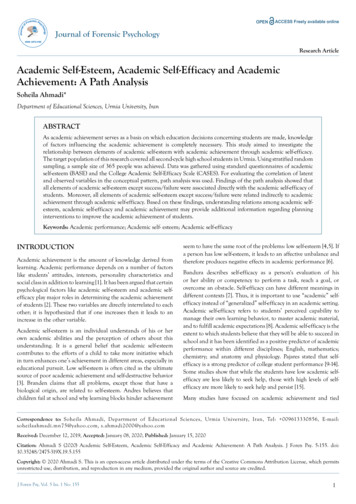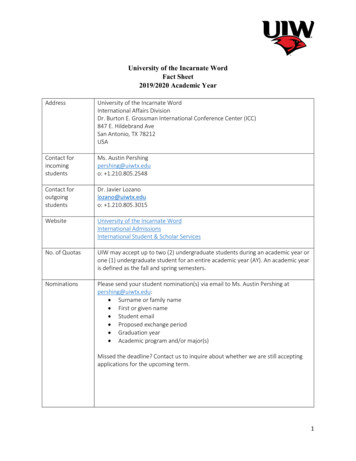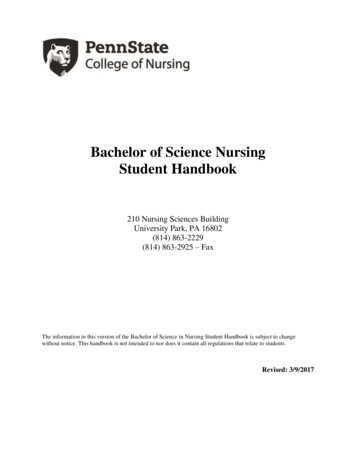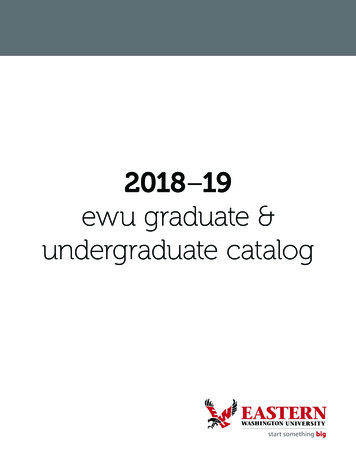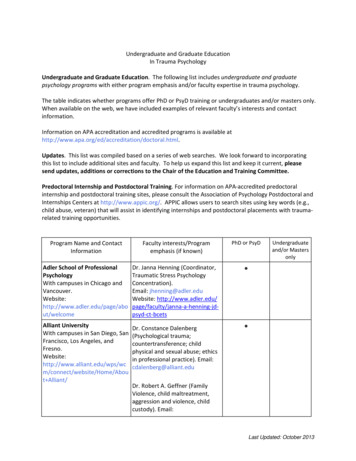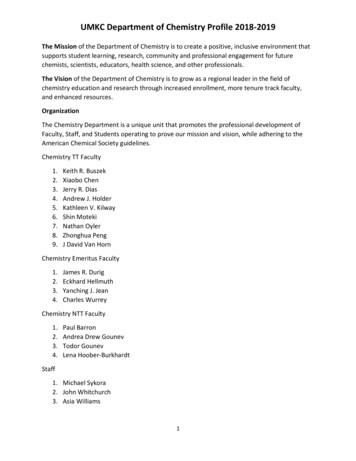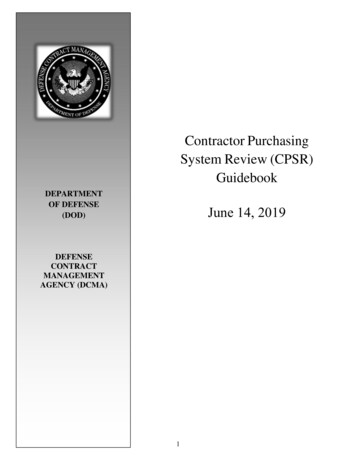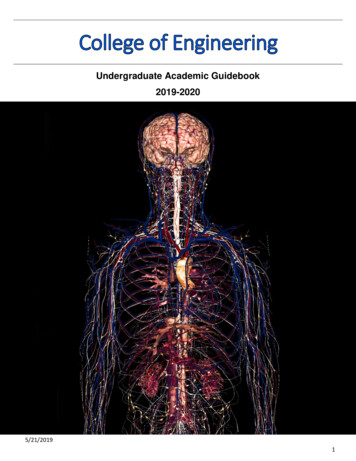
Transcription
Undergraduate Academic Guidebook2019-20205/21/20191
Engineering Admissions – New Students – First Time in College/Freshman ApplicantsIn addition to UNT admissions requirements, you must also meet one of the following criteria: Top 25% of high school graduating classMATH SAT score of 590 or better and a total SAT score of 1140 or betterMATH ACT score of 23 or better and a composite ACT score of 23 or betterTop 50% of high school graduating classMATH SAT score of 620 or better and a total SAT score of 1170 or betterMATH ACT score of 24 or better and a composite ACT score of 24 or better51% or lower high school graduating classMATH SAT score of 650 or better and a total SAT score of 1250 or betterMATH ACT score of 26 or better and a composite ACT score of 26 or betterNo high school rank (GED or homeschooled) or international high schoolMATH SAT score of 620 or better and a total SAT score of 1170 or betterMAT ACT score of 24 or better and a composite ACT score of 24 or betterConstruction Engineering Technology or Mechanical Engineering Technology can earn MATH SAT score of570 or better or MATH ACT score of 22 or better regardless of rankEngineering Admissions – New Students – Transfer & 2nd Bachelor’s Degree ApplicantsIn addition to UNT admissions requirements, you must also meet all of the following criteria: Minimum 2.0 GPA based on all transfer courseworkMinimum 2.0 GPA based on all transfer mathematics, science, engineering, & computingcourseworkEligibility to enter MATH 1710, Calculus I, via prerequisite completion or testing (see next page)Pre-Engineering Major ProgramIf you do not meet the above criteria, you will be in the Pre-Engineering Major program. You may be eligiblefor admissions into the engineering major you desire when you meet criteria below.Engineering Admissions – UNT Students – Pre-Major Engineering & Change of Major ApplicantsTo be admitted from Pre-Major or another UNT major, you must meet all of the following criteria: Minimum 2.0 GPA based on all UNT courseworkMinimum 2.5 GPA & minimum “C” grades in the courses below per your destination engineeringmajorBiomedical Engineering:Communications Core, TECM 2700MATH 1710, MATH 1720BMEN 1300, BMEN 1400Construction Engineering Technology:Communications Core, TECM 2700MATH 1710, PHYS 1710/1730, ENGR 1030CNET 1160, CNET 2180Computer Engineering/Computer Science/Information Technology:Communications Core, TECM 2700MATH 1710, CSCE 1030, CSCE 1040Electrical Engineering:Communications Core, TECM 2700MATH 1710, MATH 1720, PHYS 1710/1730EENG 1910Materials Science and Engineering:Communications Core, TECM 2700MATH 1710, MATH 1720, PHYS 1710/1730CHEM 1410/1430, CHEM 1420, MTSE 1100Mechanical and Energy Engineering:Communications Core, TECM 2700MATH 1710, MATH 1720, PHYS 1710/1730MEEN 1000Mechanical Engineering Technology:Communications Core, TECM 2700,MATH 1710, PHYS 1710/1730, ENGR 1304Must reach MATH 1710 readiness within 3 longsemesters and complete all criteria within 5 longsemesters or you will be removed from the PreMajor Program2
Engineering DismissalYou are required to conduct yourself in a professional manner at UNT while making successful progression towardgraduation. Failure to do so will result in dismissal from the College of Engineering. Criteria for dismissal includes(but is not limited to): Violation of the Code of Student Conduct located at deanofstudents.unt.edu/conduct. This includes, (butis not limited to) dishonesty, cheating, disruptive behavior, theft, hazing, abuse, violence, etc.Failure to enroll in engineering required coursework and/or prerequisites each semester.Failure to reach or maintain grade and/or GPA criteria for engineering required coursework and/orprerequisites.Being placed on academic suspension from UNT due to UNT semester and/or cumulative GPA.MathematicsAll engineering degree plans require completion of MATH 1710, Calculus I, in the 1 st semester to attemptgraduation in a reasonable timeframe.Enrollment in MATH 1710 is contingent on (1) completion of placement tests, or (2) completion of College levelmath prerequisite courses, or (3) college level math credit earned via AP, IB, or CLEP.Prerequisite Course Sequence for Calculus I:MATH 1100, College Algebra MATH 1650, Pre-Calculus MATH 1710, Calculus IIf you are TSI incomplete in math, you may have additional courses to take before you can enroll in MATH 1100.AP, IB, CLEP, DC, Transfer Credits:AP Calculus AB score of 3 or higher: MATH 1710AP Calculus BC score of 3 or higher: MATH 1710, 1720AP Calculus AB sub score of BC score 3 or higher: MATH 1710IB Mathematics – Calculus: MATH 1710CLEP College Algebra: MATH 1100CLEP Pre-calculus: MATH 1650CLEP Calculus: MATH 1710Community College MATH 1314 or 1414: MATH 1100Community College MATH 2312 or 2412: MATH 1650Community College MATH 2313 or 2413 or 2513: MATH 1710Pre-Placement for First Time in College/Freshmen:If you have not earned credit for math courses via AP, IB, CLEP, dual credit or transfer credit and you are TSIcomplete, you must begin math courses based on your Math Group Level assigned by the Math Department: Math Level 1 or No Math Level: MATH 1100Math Level 2: MATH 1650Math Level 3: MATH 1710Placement Testing Options:If you feel that you are capable of beginning your math course at a higher level than your Math Group Level orqualification based on earned math credit, you can seek approval via 3 testing options: Pearson MyMathTest – free online test. Must score a minimum of 70 to enter MATH 1710. Must score aminimum of 10 to enter MATH 1650ALEKS – online test which requires a small fee and completion of a 6 week long tutorial. Must score aminimum of 70 to enter MATH 1710. Must score a minimum of 50 to enter MATH 1650. Must download aweb browser called Respondus Lockdown Browser and purchase a license for Respondus Monitor. Musthave access to a webcam to complete ALEKS.Please refer to the Mathematics Department at (940) 565-2155 or math.unt.edu for more testing information.3
CoursesAll UNT courses are documented using a four letter subject abbreviation and four digit numberAbbreviations: ENGL for EnglishHIST for HistoryNumbers: Freshman 1000Sophomore 2000Junior 3000Senior 4000Different types of courses at UNT:Prerequisite or “Prereq”: course that must be completed to move onto another course in a sequence.Corequisite or “Coreq”: course that must be taken in the same semester as another course.Recitation or “Rec”: extra, required meeting time to cover homework, take tests, answer questions, etc.Laboratory or “Lab”: required time that’s an application of the information that you learn in class.Advanced course: junior or senior level course.Internet course or “INET”: course in which the majority of instruction, assignments, and work is online.Blended course: course in which a portion of the instruction, assignments, and work is online.Restricted: course or section time that is limited to certain students such as Honors, Out of State, Majors.Frisco, course taught at the Frisco campus in Frisco, Texas.CHEC: course taught at the Collin Higher Education Center in McKinney, Texas.Different semester offerings of courses at UNT:Fall: August to DecemberSpring 3 Week (winter): DecemberTo JanuarySpring: January to MaySummer 3 Week: MaySummer 5 Week 1: June to JulySummer 8 Week: May to July Summer 5 Week 2: July to AugustSummer 10 Week: June to AugustCredit HoursNumber of units assigned to each course. Referred to as “credits”, “hours”, or “credit hours”. Tells youapproximately how many hours per week you’ll be in class and approximately how many hours per week you’llneed to study for that course. It’s also used in the calculation of your GPA.How many hours do I earn for each course?Depends on the course. Usually 3 – 4 hours but courses can range from 1 – 5 hours.How many credits is full-time?12 hours (approximately 4 courses).How many hours can I take each semester?19 hours in the fall/spring semesters and 18 hours in the summer. This applies to credits enrolled at UNT and anotherinstitution (concurrent enrollment). You can receive overload approval to take more hours if you have met thefollowing criteria:At least a 3.0 GPA on a minimum 15 hour UNT residence load for the semester just completed.At least a 3.0 GPA on a minimum 12 hour UNT residence load for the summer terms just completed.At least a 3.0 GPA on all work completed at UNT and a minimum 24 hours of credit in residence.Do I have to be a full-time student?No, not unless you are an international student, an athlete, a scholarship receipt or receiving maximum financialaid. To attempt a timely graduation date, you should plan to take 15-16 hours unless you work. Your number ofwork hours will impact the number of credit hours you should attempt each semester/term. Please consult withyour advisor to determine the proper balance of work and school.ClassificationYour classification is based on the number of earned credit hours after semester grade posting; not the number ofyears you have been in school. Classification dictates your registration appointment time each semester and mayimpact your eligibility for scholarships, financial aid, internships, etc.Freshman:Sophomore:0 – 29 hours30 – 59 hoursJunior:Senior:60 – 89 hours90 hours4
Grade Point Average (GPA)Grades have a point value and courses are worth a certain amount of credit hours. GPA is calculated bydividing the number of grade points earned by the number of attempted hours. Attempted credit hours areused in calculating GPA. Credit hours earned by AP, CLEP, or IB and courses dropped “W” don’t count asattempted hours and don’t average into your GPA. Grades of “F” are attempted hours and count heavilyagainst your GPA.How do grades convert to grade points? A 4 points x # of credit hours course is worthB 3 points x # of credit hours course is worthC 2 points x # of credit hours course is worthD 1 points x # of credit hours course is worthF 0 points x # of credit hours course is worthHow to calculate your GPA: Determine grade points for each course using the conversion aboveTotal your number of grade pointsTotal your number of attempted hoursDivide total grade points by total attempted hoursNumber that results your GPADifferent types of GPAs: Semester or Term GPA: the GPA you earned for the semester/term just enrolled.UNT GPA: the cumulative GPA you earn in all UNT courses. A minimum 2.0 GPA is required.Overall GPA: GPA you earn in all courses (UNT and transfer). A minimum 2.0 GPA is required.Foundations GPA: GPA you earn in foundations courses. A minimum 2.5 GPA is required.Major GPA: the GPA you earn in courses in your major. A minimum 2.0 GPA is requiredYou can access a GPA calculator at Grade Point Average (GPA): Academic StatusYour cumulative UNT grades are used to calculate academic status. Grades earned in transfer areconsidered in calculation of Graduation with Honors and fulfillment of degree requirements but are notconsidered with determination of academic status.Academic Good Standing:Standing if you earn at least a cumulative 2.0 UNT GPA. A 1.8 UNT GPA is acceptable during your 1 stsemester at UNT but it must be increased to at least a 2.0 after your 1 st semester.Academic Alert:Standing if you are a freshman and your UNT GPA falls below 1.8 during the 1 st semester or falls below 2.0during the 2nd semester. You can only be placed on alert once. You will be required to participate inacademic coaching sessions via the Learning Center during your alert semester. You must raise your UNTGPA to 2.0 or higher during your alert semester or you will be placed on probation.Academic Probation:Standing if you are not eligible for alert and your UNT GPA falls below 1.8 during the 1 st semester or fallsbelow 2.0 during any following semester. You must raise your UNT GPA to 2.0 to return to good standing orearn a semester GPA of at least 2.25 to remain on probation. You will be required to participate inacademic coaching session via the Learning Center during your probation semester.Academic Suspension:Standing if you fail to raise your UNT GPA to a 2.0 or earn a 2.25 semester GPA while on probation. You areprohibited from attending UNT for 1 long semester for a 1st suspension or 2 long semester for a 2nd suspension.You must petition to re-enter the College of Engineering after completing the 1st or 2nd suspension period.You might be approved to return. You will be dismissed permanently from the College of Engineering if youare suspended a 3rd time.5
Grade Point Average (GPA): HonorsSemester Honors:Semester honors is based on your fall or spring semester GPA and is documented on your UNT transcript. Youmust complete at least 12 hours to be recognized for honors. Summer GPA is not recognized for honors.Candidates for a 2nd bachelor’s degree are not eligible for semester honors.President’s List: 4.000Dean’s List: 3.500-3.999Graduation with Honors:Graduation with honors is based on your overall (UNT and transfer) GPA and is documented on your UNTtranscript. Candidates for a 2nd bachelor’s degree are not eligible for graduation honors.Cum laude: 3.500 – 3.699Magna cum laude: 3.700 – 3.899Summa cum laude: 3.900 – 4.000Retaking Courses: Course DuplicationsIf your transcript(s) contains the same course with an earned grade more than once, the 1 st grade will betreated as a duplication and will be deleted from your GPA. Any additional grades will be calculated intoyour GPA. This includes transfer courses/grades. Course duplication will impact your GPA, your academicstatus and excessive hours.Engineering major required courses must be completed with a grade of C or better by the 2 nd attempt.Only the last grade will be used in fulfilling prerequisite, corequisite, and graduation eligibility. Contact youradvisor to confirm how you will be affected if you take a course more than once.Dropping or WithdrawingDropping:Dropping refers to removing yourself from one or more courses for the semester (but you remain in at leastone course for the semester). You can drop yourself via MyUNT before or shortly after the semester begins.The MyUNT drop functionality usually expires on the 1st day of summer semester and approximately 12 daysinto the fall/spring semesters. After the MyUNT drop functionality expires, you may drop via the proceduresand deadlines listed online. Please note that if you are enrolled in only one course for a summer session andyou need to remove that one course, it is considered a withdrawal and not a drop. Please see withdrawalinformation below. Only 6 drops are allowed during your academic career unless you began collegebefore the fall semester of 2007. Once the 6 drop limit is reached, no additional drops are approved.Withdrawing:Withdrawing refers to dropping all courses for the semester. You are not allowed to withdraw via MyUNT.You may withdraw via the procedures and deadlines listed online.Dropping or withdrawing may affect your financial aid and/or excessive hours.Pass/No Pass Grading OptionYou may elect to take courses which are not needed for your degree plan or graduation under the Pass/NoPass Grading Option. Certain criteria must be met and you must obtain approval from your advisor afteryou have enrolled in the course. A “grade” of “P” or “NP” will be recorded on your transcript. This “grade” isnot calculated in your GPA.IncompletesAn “I” or “Incomplete” grade is a pending grade on your record which does not affect your GPA. An “I”may be granted by the professor if you meet all of the following conditions: The final drop and withdraw deadlines for the semester/term have passed.You experience an emergency situation that prohibits you from completing remaining work.You have been earning a passing grade to the point of the emergency situation.You can complete and submit outstanding work within 12 months after the grade of “I” is granted.Professors are not required to grant an “I” even if you meet the conditions. An automatic grade of “F” willbe posted on your transcript if you do not complete the “I” within 12 months.6
Taking Courses at another Institution: Concurrent EnrollmentCourses taken outside of UNT will not be applied to your degree audit unless you meet all of the followingcriteria: The course you plan to take has been pre-approved by your advisor.You do not violate the maximum semester/term credit hour limit or residency requirements at UNT.You are not attempting to graduate the same semester/term in which you are concurrently enrolled.You submit the official transcript for the course to the Registrar’s Office within one month ofcompletion.Please note that your department reserves the right to reject online courses and/or courses at certaininstitutions.RegistrationYou will be using MyUNT to register for courses each semester/term. Information on registration enrollmentperiods, payment deadlines, etc. can be located at registration.unt.edu.Full Courses/Waitlist:If a course is full, add yourself to the waitlist. Seats are allotted in position order as fully enrolled studentsvacate the course. The waitlist will not guarantee a seat in the course. You can waitlist for a maximum of 3courses per semester/term. The waitlist option ends once add/drop closes for the semester/term.Error Messages:Read the message to learn why you received it and to determine if you are eligible to enroll in the course.Common errors refer to prerequisite, corequisite, and restricted sections.Overrides:Contact the department that teaches the course if you received an error message by mistake and youneed to enroll in the open course. Below are department contacts for some common courses: BIOLBMENCHEMCNETCSCE EENGELETENGRMATH MEEN MEETMFETMTSENUETPHYSTECM Biological Sciences Department: BIOL 210 or (940) 565-3591Biomedical Engineering Department: Jamie.Tesdahl@unt.edu; DP B-131 or (940) 565-3338Chemistry Department: CHEM 101 or (940) 565-3525Engineering Technology Department: e-mail etec.etec@unt.edu; DP F-115 or (940) 565-2022Computer Science and Engineering Department: DP F-201 or (940) 565-2767or submit request via www.cse.unt.edu/overrides (preferred method)Electrical Engineering Department: DP B-270 or (940) 891-6872Engineering Technology Department: e-mail etec.etec@unt.edu; DP F-115 or (940) 565-2022Engineering Technology Department: e-mail etec.etec@unt.edu; DP F-115 or (940) 565-2022Mathematics Department: GAB 435 or (940) 565-2155 or e-mail Rita Sears atRita.Sears@unt.edu (preferred method)Mechanical and Energy Engineering Department: DP F-101 or (940) 565-2400or se-override-requestEngineering Technology Department: e-mail etec.etec@unt.edu; DP F-115 or (940) 565-2022Engineering Technology Department: e-mail etec.etec@unt.edu; DP F-115 or (940) 565-2022Materials Science and Engineering Department: DP E-132 or (940) 565-3260Engineering Technology Department: e-mail etec.etec@unt.edu; DP F-115 or (940) 565-2022Physics Department: PHYS 110 or (940) 565-2626Technical Communication Department: AUDB 317 or (940) 565-4458PaymentYou must arrange payment prior to the payment deadline listed in MyUNT or online. Failure to pay by thedeadline listed will result in the cancellation of your entire schedule of classes. You must elect a tuition planbefore your 1st semester/term payment deadline. Information on plans is located at sfs.unt.edu. You havenumerous options available to pay. Refer to registration.unt.edu/cost-funding for information. If you havebeen awarded financial aid, refer to financialaid.unt.edu for information.7
Tuition IncreasesRepeated Course Tuition Increase:If you are a resident and you attempt courses for a 3rd time, you are subject to pay an additional tuition rateper semester credit hour for the repeated course. Refer to information at sfs.unt.edu.Excessive Hours Regarding Tuition:Texas code specifies that a resident may be subject to a higher tuition rate for attempting excessive hoursat any public institution. You cannot exceed more than 30 credit hours (or 45 credit hours if you startedschool prior to fall 2006) of the number of hours required for the completion of your degree plan. Anyadditional hours are considered excessive and will result in additional tuition charges. Refer to information atsfs.unt.edu.Maximum Hours Regarding Financial Aid:If you receive financial aid and maintain Satisfactory Academic Progress (SAP) and Pace of Progression(POP), your aid eligibility continues until you attempt 150% of the minimum credit hours required for yourdegree plan. For most students, once they attempt approximately 180 credit hours, their aid is discontinued.Degree Audit (Plan)The degree audit is an official document that lists all the requirements you need to complete to earn yourdegree. It tracks the application of completed requirements each semester/term. A degree audit must becreated for you in order to progress toward graduation. Please contact the Engineering Advising Office forany questions or concerns. Registrar.unt.edu Registration Online Degree Audit OR My.unt.edu Student Center My Academics Run Audit.GraduationYou must make an appointment with the Engineering Advising Office the semester/term before you plan tograduate to confirm that you are on track. Graduation can usually be achieved 4 years after you areenrolled in Calculus I (MATH 1710), enrolled in the entry level engineering course(s) for your major, follow thecorrect requisite sequencing, follow the correct semester scheduling path, earn passing grades eachsemester/term, and complete approximately 30 degree accountable credits per year. Please note thatgraduation often occurs within 5-6 years for most students.You must apply for graduation at the beginning of your final semester via your Student Center in MyUNT.Refer to registrar.unt.edu for more information and the application deadline. Failure to apply by thedeadline will result in your failure to graduate or earn your degree even if you complete all of your degreeaudit requirements. You cannot enroll in another institution during your final semester/term or else yourgraduation will be delayed.CommencementCommencement is the name of the graduation ceremony. Commencement is offered in December forstudents who earn their degree in fall or May for students who earn their degree in spring. Students whoearn their degree in summer can choose to attend the December or May commencement. In order toattend commencement, you must have applied for and been approved for graduation at the beginningof your final semester. Refer to unt.edu/commencement for more information.North Texas Discovery Park (NTDP)North Texas Discovery Park (NTDP) is a 2nd campus located 4 miles north of the main campus. It is thelocation of all College of Engineering offices, classes, and labs. NTDP also offers a cafeteria, library,computer access labs, specialty engineering labs, engineering student organizations, an advising office,tutoring services, and a career services office.Information on free bus transportation routes/times and available student parking passes/locations can befound at unt.edu/transit.8
AdvisingAcademic Advisors:These advisors work with you to ensure that you are meeting academic goals and requirements in order to earn yourdegree. You should meet with your academic advisor each semester. You will be required to meet with your advisor ifyou are a freshman/FTIC, pre-major, or your GPA falls below good standing. Use appointments.unt.edu to schedule yourappointment. Allow 3 weeks for an available appointment and note that you will lose your appointment if you arrivelate. The office is located in NTDP-A101. The phone number is 940-565-4201. E-mail contact information for the advisors islocated at engineering.unt.edu/advising/advisors. Below are the available academic advisors.Engineering Faculty Advisors:These professors assist with advising. They can help you with choosing the proper elective, specialization, track, orsupporting area courses to prepare you to enter industry after graduation. Contact information is located on thefollowing curriculum pages. Below are the available faculty advisors.Career Advisor:Located in NTDP C-111 and Chestnut Hall 103, this advisor helps you with career planning, major selection, resumewriting, interviewing skills, internship and full-time employment. You can schedule an appointment in person or via 940565-2105.Degree Program/MajorPre-Biomedical EngineeringPre-Computer EngineeringPre-Computer SciencePre-Construction EngineeringTechnologyPre-Electrical EngineeringPre-Information TechnologyPre-Materials Science and EngineeringPre-Mechanical and EnergyEngineeringPre-Mechanical EngineeringTechnologyBiomedical EngineeringComputer EngineeringComputer ScienceConstruction Engineering TechnologyElectrical EngineeringInformation TechnologyMaterials Science and EngineeringMechanical and Energy EngineeringMechanical Engineering TechnologyAcademic AdvisorsDavid BekkerAzucena (Susie) PruittDavid BekkerAzucena (Susie) PruittDavid BekkerAzucena (Susie) PruittDavid BekkerAzucena (Susie) PruittDavid BekkerAzucena (Susie) PruittDavid BekkerAzucena (Susie) PruittDavid BekkerAzucena (Susie) PruittDavid BekkerAzucena (Susie) PruittFaculty AdvisorsDr. VijayVaidyanathanDr. RobinPottathuparambilDr. Mark ThompsonDr. Joseph HelsingMr. Al AttahCareer AdvisorLaura GarzaDr. Colleen BaileyLaura GarzaMr. David KeathlyDr. Ryan GarlickDr. Marcus YoungLaura GarzaDr. Cherish QuallsDr. Xiahoua LiLaura GarzaDavid BekkerAzucena (Susie) PruittAbdal ElkharoubiErrica SmithAbdal ElkharoubiErrica SmithHeather BurrowAbdon GonzalezBeverly WilksMia DallasRachel SmithAdrian StephensAbdal ElkharoubiErrica SmithHeather BurrowAbdon GonzalezBeverly WilksNancy Van HoyDr. Leticia AnayaLaura GarzaDr. VijayVaidyanathanDr. RobinPottathuparambilDr. Mark ThompsonDr. Joseph HelsingLaura GarzaMr. Al AttahLaura GarzaDr. Colleen BaileyLaura GarzaMr. David KeathlyDr. Ryan GarlickLaura GarzaDr. Marcus YoungLaura GarzaMia DallasRachel SmithAdrian StephensMia DallasRachel SmithAdrian StephensDr. Cherish QuallsDr. Xiahoua LiLaura GarzaDr. Leticia AnayaLaura GarzaLaura GarzaLaura GarzaLaura GarzaLaura GarzaLaura GarzaLaura Garza9
BIOMEDICAL ENGINEERINGBachelor of Science (B.S.) degree with a major in Biomedical EngineeringBiomedical Engineering Department, Discovery Park B-131; (940) 565-3338Major RequirementsUniversity CoreCOMMUNICATION 1 Course (3 Hours) chosen from options on Page 29Grade of “C” or better is requiredAMERICAN HISTORY I 1 Course (3 Hours) chosen from HIST 2610 or HIST 2675AMERICAN HISTORY II 1 Course (3 Hours) chosen from HIST 2620 or HIST 2685FEDERAL GOVERNMENT/POLITICAL SCIENCE 1 Course (3 Hours) chosen from PSCI 2305 or PSCI 2315STATE GOVERNMENT/POLITICAL SCIENCE 1 Course (3 Hours) chosen from PSCI 2306 or PSCI 2316CREATIVE ARTS 1 Course (3 Hours) Chosen from options on page 29LANGUAGE, PHILOSOPHY, AND CULTURE 1 Course (3 Hours) Chosen from options on page 29SOCIAL AND BEHAVIORAL SCIENCES 1 Course (3 Hours) Chosen from options on page 29Major RequirementsMinimum 2.0 GPABIOMEDICAL ENGINEERING BMEN 1300, Discover Biomedical Engineering (3 Hours)BMEN 1400, Software for Biomedical Engineers (4 Hours)BMEN 2210, DAQ Practices (3 Hours)BMEN 2320, Biomedical Instrumentation (3 Hours)BMEN 3310, Engr. Measurements from Human Systems (3 Hours)BMEN 3311, Biomedical Signal Analysis (3 Hours)BMEN 3312, Introduction to Biomechanics (3 Hours)BMEN 3321, Biomaterials (3 Hours)BMEN 3350, Biomedical Transport Phenomena (3 Hours)BMEN 4310, Biomedical Modeling (3 Hours)BMEN 4212, Senior Design I (1 Hour)BMEN 4222, Senior Design II (3 Hours)BMEN 4***, Advanced Elective (3 Hours)BMEN 4***, Advanced Elective (3 Hours)BMEN 4***, Advanced Elective (3 Hours)BIOMEDICAL ENGINEERING ELECTIVE TRACKChoose an elective track and complete a minimum of 6 courses(18 Hours) from the approved options below: Track Elective (3 Hours)Track Elective (3 Hours)Track Elective (3 Hours) Track Elective (3 Hours)Track Elective (3 Hours)Track Elective (3 Hours)Minimum 2.0 GPABiomedical Instrumentation Elective Track:TECHNICAL COMMUNICATIONS TECM 2700, Technical Writing (3 Hours)MATHEMATICS MATH 1710, Calculus I (4 Hours) MATH 1720, Calculus II (3 Hours) MATH 2700, Linear Algebra (3 Hours) MATH 2730, Multivariable Calculus (3 Hours) orMATH 3350, Numerical Analysis (3 Hours) MATH 3410, Differential Equations (3 Hours) MATH 3680, Applied Statistics (3 Hours)Completion of the above courses will earn a Mathematics minor.SCIENCES CHEM 1410, General Chemistry I (3 Hours) &CHEM 1430, General Chemistry I Lab (1 Hour)PHYS 1710, Mechanics (3 Hours) &PHYS 1730 Mechanics Lab (1 Hour)1 Lab science and lab chosen from:BIOL 2301, Human Anatomy & Physiology (3 Hours) &BIOL 2311, Human Anatomy & Physiology Lab (1 Hour) orCHEM 1420, General Chemistry II (3 Hours) &CHEM 1440, General Chemistry II Lab (1 Hour) orPHYS 2220, Electricity & Magnetism (3 Hours) &PHYS 2240, Electricity & Magnetism Lab (1 Hour)EENG 2610/2611, 2620/2621, 2710/2711, 3510, & 4*** level course.Completion of this track will earn an Electrical Engineering minor.Biomechanics Elective Track:MEEN 2301, 2302, 2210, 2332, & two MEEN 3*** and/or 4*** levelcourses. See advisor for specific course choices.Completion of an additional MEEN 3*** and/or 4*** level specificcourse in addition to this track will earn a Mechanical and EnergyEngineering minor.Biocomputing Elective Track:CSCE 1030, 1040, 2100, 2110, & two CSCE 3*** and/or 4*** levelcourses.Completion of this track will earn a Computer Science andEngineering minor.Biomaterials Elective Track:MTSE 3000, two courses from 3010, 3030, 3050, 3070, plus 3 MTSE 3***or 4*** level courses. MTSE 3001 is strongly recommended.Completion of this track will earn a Materials Science andEngineering minor.Pre-Medical Elective Track:BIOL 1710, 1720, 1760, 2041/2042, C
MATH SAT score of 650 or better and a total SAT score of 1250 or better MATH ACT score of 26 or better and a composite ACT score of 26 or better . need to study for that course. It's also used in the calculation of your GPA. How many hours do I earn for each course? Depends on the course. Usually 3 - 4 hours but courses can range from 1 .

